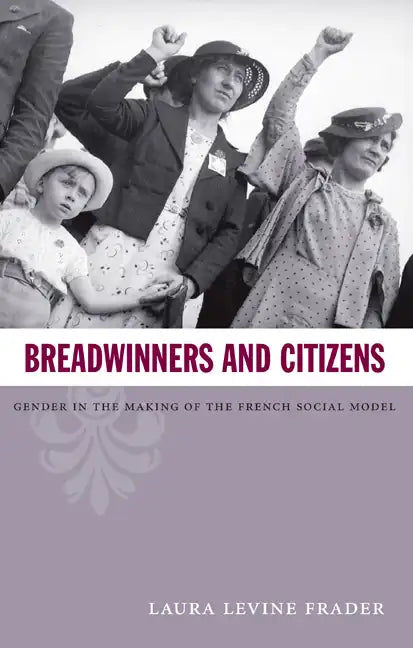Breadwinners and Citizens: Gender in the Making of the French Social Model - Paperback
Breadwinners and Citizens: Gender in the Making of the French Social Model - Paperback
Couldn't load pickup availability
by Laura Levine Frader (Author)
Laura Levine Frader's synthesis of labor history and gender history brings to the fore failures in realizing the French social model of equality for all citizens. Challenging previous scholarship, she argues that the male breadwinner ideal was stronger in France in the interwar years than scholars have typically recognized, and that it had negative consequences for women's claims to the full benefits of citizenship. She describes how ideas about masculinity, femininity, family, and work affected post-World War I reconstruction, policies designed to address France's postwar population deficit, and efforts to redefine citizenship in the 1920s and 1930s. She demonstrates that gender divisions and the male breadwinner ideal were reaffirmed through the policies and practices of labor, management, and government. The social model that France implemented in the 1920s and 1930s incorporated fundamental social inequalities.
Frader's analysis moves between the everyday lives of ordinary working women and men and the actions of national policymakers, political parties, and political movements, including feminists, pro-natalists, and trade unionists. In the years following World War I, the many women and an increasing number of immigrant men in the labor force competed for employment and pay. Family policy was used not only to encourage reproduction but also to regulate wages and the size of the workforce. Policies to promote married women's and immigrants' departure from the labor force were more common when jobs were scarce, as they were during the Depression. Frader contends that gender and ethnicity exerted a powerful and unacknowledged influence on French social policy during the Depression era and for decades afterward.
Back Jacket
In this valuable book, Laura Levine Frader focuses on the French social model, the ideal of egalitarian social citizenship shaped and refined in the first half of the twentieth century. She argues that it was systematically undermined by employers, organized labor, and the state itself through practices and policies that built into it gender and anti-immigrant biases. Her insights, methods, and conclusions will be interesting to historians of other industrial societies whose welfare states are today under challenge from women and immigrant workers seeking equality of treatment.--Herman Lebovics, SUNY Trustees Distinguished Professor, Stony Brook University, author of "Bringing the Empire Back Home: France in the Global Age"
Author Biography
Laura Levine Frader is Professor of History and Chair of the History Department at Northeastern University. She is the author of The Industrial Revolution and Peasants and Protest: Agricultural Workers, Politics, and Unions in the Aude, 1850-1914. She is a coeditor of Gender and Class in Modern Europe and of Race in France: Interdisciplinary Perspectives on the Politics of Difference.


